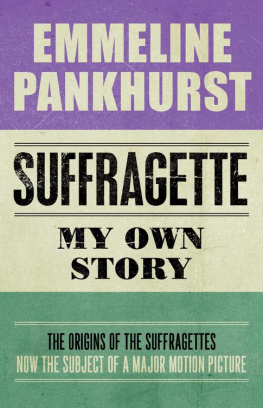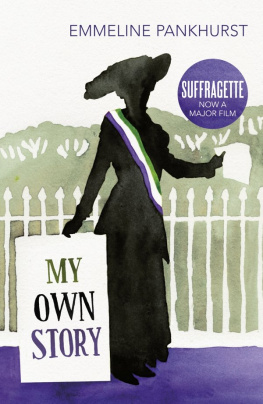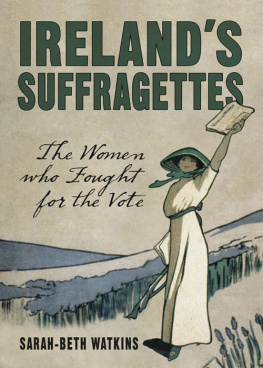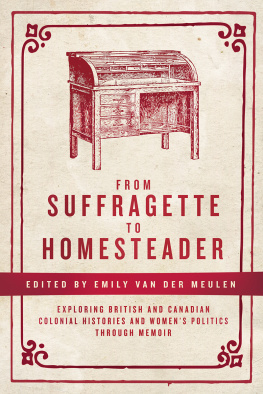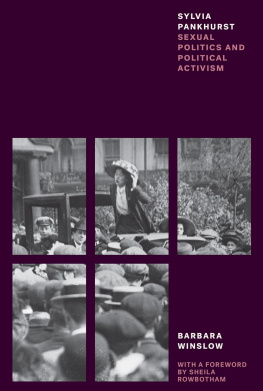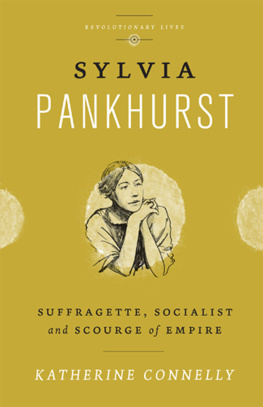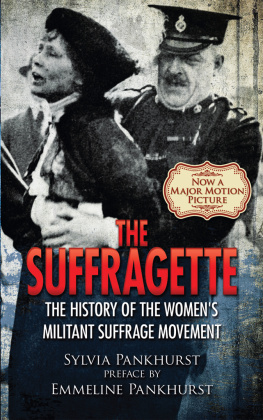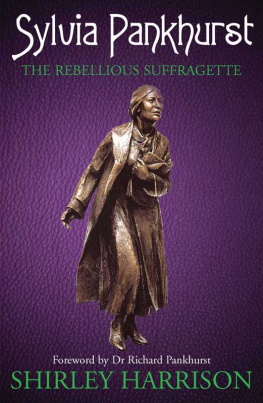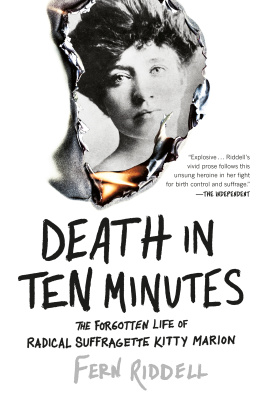The closing paragraphs of this book were written in the late summer of 1914, when the armies of every great power in Europe were being mobilised for savage, unsparing, barbarous warfare against one another, against small and unaggressive nations, against helpless women and children, against civilisation itself. How mild, by comparison with the despatches in the daily newspapers, will seem this chronicle of womens militant struggle against political and social injustice in one small corner of Europe. Yet let it stand as it was written, with peace so-called, and civilisation, and orderly government as the background for heroism such as the world has seldom witnessed. The militancy of men, through all the centuries, has drenched the world with blood, and for these deeds of horror and destruction men have been rewarded with monuments, with great songs and epics. The militancy of women has harmed no human life save the lives of those who fought the battle of righteousness. Time alone will reveal what reward will be allotted to the women.
This we know, that in the black hour that has just struck in Europe, the men are turning to their women and calling on them to take up the work of keeping civilisation alive. Through all the harvest fields, in orchards and vineyards, women are garnering food for the men who fight, as well as for the children left fatherless by war. In the cities the women are keeping open the shops, they are driving trucks and trams, and are altogether attending to a multitude of business.
When the remnants of the armies return, when the commerce of Europe is resumed by men, will they forget the part the women so nobly played? Will they forget in England how women in all ranks of life put aside their own interests and organised, not only to nurse the wounded, care for the destitute, comfort the sick and lonely, but actually to maintain the existence of the nation? Thus far, it must be admitted, there are few indications that the English Government are mindful of the unselfish devotion manifested by the women. Thus far all Government schemes for overcoming unemployment have been directed towards the unemployment of men. The work of women, making garments, etc., has in some cases been taken away.
At the first alarm of war the militants proclaimed a truce, which was answered half-heartedly by the announcement that the Government would release all suffrage prisoners who would give an undertaking not to commit further crimes or outrages. Since the truce had already been proclaimed, no suffrage prisoner deigned to reply to the Home Secretarys provision. A few days later, no doubt influenced by representations made to the Government by men and women of every political faith many of them never having been supporters of revolutionary tactics Mr McKenna announced in the House of Commons that it was the intention of the Government, within a few days, to release unconditionally, all suffrage prisoners. So ends, for the present, the war of women against men. As of old, the women become the nurturing mothers of men, their sisters and uncomplaining helpmates. The future lies far ahead, but let this preface and this volume close with the assurance that the struggle for the full enfranchisement of women has not been abandoned; it has simply, for the moment, been placed in abeyance. When the clash of arms ceases, when normal, peaceful, rational society resumes its functions, the demand will again be made. If it is not quickly granted, then once more the women will take up the arms they today generously lay down. There can be no real peace in the world until woman, the mother half of the human family, is given liberty in the councils of the world.
Those men and women are fortunate who are born at a time when a great struggle for human freedom is in progress. It is an added good fortune to have parents who take a personal part in the great movements of their time. I am glad and thankful that this was my case.
One of my earliest recollections is of a great bazaar which was held in my native city of Manchester, the object of the bazaar being to raise money to relieve the poverty of the newly emancipated negro slaves in the United States. My mother took an active part in this effort, and I, as a small child, was entrusted with a lucky bag by means of which I helped to collect money.
Young as I was I could not have been older than five years I knew perfectly well the meaning of the words slavery and emancipation. From infancy I had been accustomed to hear pro and con discussions of slavery and the American Civil War. Although the British government finally decided not to recognise the Confederacy, public opinion in England was sharply divided on the questions both of slavery and of secession. Broadly speaking, the propertied classes were pro-slavery, but there were many exceptions to the rule. Most of those who formed the circle of our family friends were opposed to slavery, and my father, Robert Goulden, was always a most ardent abolitionist. He was prominent enough in the movement to be appointed on a committee to meet and welcome Henry Ward Beecher when he arrived in England for a lecture tour. Mrs Harriet Beecher Stowes novel, Uncle Toms Cabin, was so great a favourite with my mother that she used it continually as a source of bedtime stories for our fascinated ears. Those stories, told almost fifty years ago, are as fresh in my mind today as events detailed in the mornings papers. Indeed they are more vivid, because they made a much deeper impression on my consciousness. I can still definitely recall the thrill I experienced every time my mother related the tale of Elizas race for freedom over the broken ice of the Ohio River, the agonising pursuit, and the final rescue at the hands of the determined old Quaker. Another thrilling tale was the story of a negro boys flight from the plantation of his cruel master. The boy had never seen a railroad train, and when, staggering along the unfamiliar railroad track, he heard the roar of an approaching train, the clattering car-wheels seemed to his strained imagination to be repeating over and over again the awful words, Catch a nigger catch a nigger catch a nigger This was a terrible story, and throughout my childhood, whenever I rode in a train, I thought of that poor runaway slave escaping from the pursuing monster.
These stories, with the bazaars and the relief funds and subscriptions of which I heard so much talk, I am sure made a permanent impression on my brain and my character. They awakened in me the two sets of sensations to which all my life I have most readily responded: first, admiration for that spirit of fighting and heroic sacrifice by which alone the soul of civilisation is saved; and next after that, appreciation of the gentler spirit which is moved to mend and repair the ravages of war.
I do not remember a time when I could not read, nor any time when reading was not a joy and a solace. As far back as my memory runs I loved tales, especially those of a romantic and idealistic character. Pilgrims Progress was an early favourite, as well as another of Bunyans visionary romances, which does not seem to be as well known, his Holy War. At nine I discovered the Odyssey and very soon after that another classic which has remained all my life a source of inspiration. This was Carlyles French Revolution, and I received it with much the same emotion that Keats experienced when he read Chapmans translation of Homer like some watcher of the skies, When a new planet swims into his ken.
I never lost that first impression, and it strongly affected my attitude towards events which were occurring around my childhood. Manchester is a city which has witnessed a great many stirring episodes, especially of a political character. Generally speaking, its citizens have been liberal in their sentiments, defenders of free speech and liberty of opinion. In the late sixties there occurred in Manchester one of those dreadful events that prove an exception to the rule. This was in connection with the Fenian Revolt in Ireland. There was a Fenian riot, and the police arrested the leaders. These men were being taken to the jail in a prison van. On the way the van was stopped and an attempt was made to rescue the prisoners. A man fired a pistol, endeavouring to break the lock of the van door. A policeman fell, mortally wounded, and several men were arrested and were charged with murder. I distinctly remember the riot, which I did not witness, but which I heard vividly described by my older brother. I had been spending the afternoon with a young playmate, and my brother had come after tea to escort me home. As we walked through the deepening November twilight he talked excitedly of the riot, the fatal pistol shot, and the slain policeman. I could almost see the man bleeding on the ground, while the crowd swayed and groaned around him.

